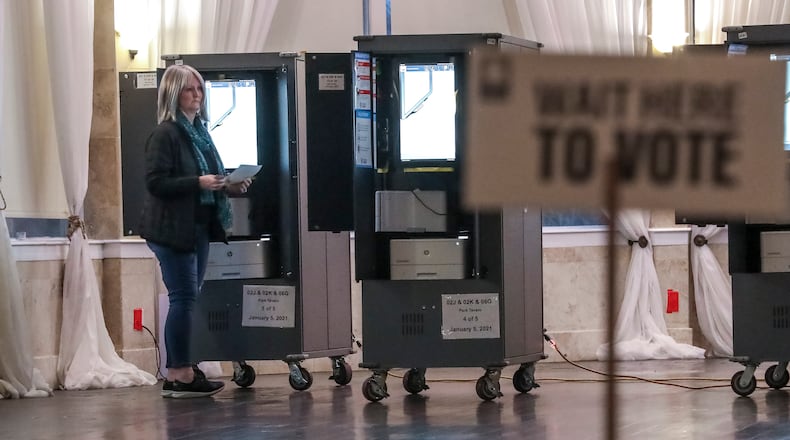Secretary of State Brad Raffensperger on Friday made public the names of nearly 102,000 people who are at risk of having their Georgia voter registrations canceled, a warning before they lose their ability to vote next month.
The mass cancellations, called voter “purges” by their critics, target registered voters who moved or didn’t participate in elections for several years.
Fewer voter registrations are being canceled this year than in 2017, when 534,000 were eliminated from Georgia’s voter rolls during the largest removal of registrations in U.S. history. Most of the state’s outdated registrations were already canceled in prior years.
The removals represent 1.3% of Georgia’s 7.8 million registered voters. Cancellations of voter registrations occur every other year as required by state law to remove ineligible or infrequent voters from the state’s voter rolls.
Even if their registrations are canceled, eligible voters can re-register to vote in future elections.
Raffensperger said canceling obsolete registrations will ensure Georgia’s voter lists are accurate.
“Making sure Georgia’s voter rolls are up to date is key to ensuring the integrity of our elections,” Raffensperger said. “That is why I fought and beat Stacey Abrams in court in 2019 to remove nearly 300,000 obsolete voter files before the November election, and will do so again this year. Bottom line, there is no legitimate reason to keep ineligible voters on the rolls.”
But the court case two years ago wasn’t a complete victory against Fair Fight Action, the voting rights group that Abrams founded.
While a federal judge rejected efforts to block cancellations of voters who had been inactive for over eight years, Raffensperger’s office agreed to reinstate 22,000 voter registrations that were ineligible to be canceled because they had participated in elections shortly before the cutoff date for inactivity.
“The last time Secretary Raffensperger conducted a massive voter purge, he was forced to admit 22,000 errors — 22,000 Georgia voters who would have been kicked off the rolls were it not for Fair Fight Action’s diligence. We’ll be reviewing the list thoroughly and reaching out to impacted voters,” said Lauren Groh-Wargo, CEO of Fair Fight Action.
In all, 287,000 Georgia voter registrations ended up being canceled in 2019.
Voters have an opportunity to save their registrations before they’re removed. Election officials are mailing notifications of their pending cancellations, and if voters respond within 40 days, their registrations will be restored to active status.
During the last batch of cancellations two years ago, about 4,500 Georgia voters prevented their registrations from being canceled after they received notification letters.
This year’s cancellations include a tiny number of registration removals under Georgia’s “use it or lose it” law, which allows election officials to remove people who didn’t participate in elections for several years or respond to mailed notification letters.
Just 276 registrations are being canceled under the “use it or lose it” law because of a decision by then-Secretary of State Brian Kemp’s office in 2017 that effectively gave voters more time before they’re canceled for inactivity. Kemp’s office didn’t change infrequent voters to “inactive” status during a lawsuit over registration cancellations at the time, meaning they gained two more years before they can be removed.
Voters are usually declared “inactive” after five years of failing to participate in elections, contact election officials, respond to election officials’ mail or update their registrations. Then their registrations are voided if they miss the next two general elections.
A federal judge recently upheld Georgia’s “use it or lose it” law, finding that canceled voters aren’t significantly burdened because they can re-register to vote.
Most of this year’s cancellations, 101,513, target voters who filed a change-of-address request with the U.S. Postal Service or had election mail returned to sender.
An additional 18,486 registrations were removed last month because they have died, based on information from the Georgia Office of Vital Records and the Electronic Registration Information Center, a partnership of 30 states to share registration information.
There’s no record of any of those deceased voters casting a ballot in the November general election or January runoffs, according to the secretary of state’s office.
How we got the story
Georgia’s voter registration cancellation laws have drawn national attention since 2017, when the largest removal of voter registrations in U.S history took place. Over 534,000 inactive voter registrations were canceled at once that year.
The Atlanta Journal-Constitution requested a list of the 102,000 voter registrations scheduled for cancellation this summer. The list’s disclosure by the secretary of state’s office on Friday gives notice to voters before they’re removed from the voting rolls.
Reasons for 2021 registration cancellations
67,286: Filed a change-of-address request with the U.S. Postal Service
34,227: Election mail was returned as undeliverable
276: Haven’t voted since 2012
18,486: Deceased and canceled in May
Voter cancellation timeline
- June: Notification letters are being mailed to about 102,000 voters whose registrations may be canceled because they’ve moved or haven’t voted since 2012. Voters have 40 days to respond before their registrations are removed from the state’s voting rolls.
- June-July: Notices will be mailed to 194,000 voters who haven’t participated in elections for five years. Voters who don’t respond within 40 days will become “inactive,” making them eligible for cancellation after the next two general elections.
- July: Letters will be mailed to 244,000 voters who appear to have moved to other states based on voter registration and driver’s license information. Those who don’t respond within 40 days will become inactive and eligible for cancellation after the next two general elections.
- July-August: Notices will be mailed to 472,000 voters who filled out national change-of-address forms indicating they moved to a different county in Georgia. Those who don’t respond within 40 days will become inactive and eligible for cancellation after the next two general elections.
Source: Georgia secretary of state’s office
About the Author
Keep Reading
The Latest
Featured



